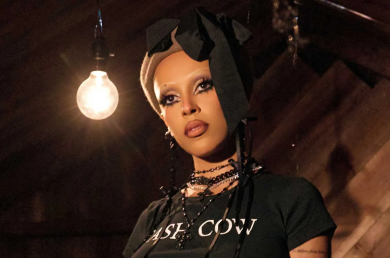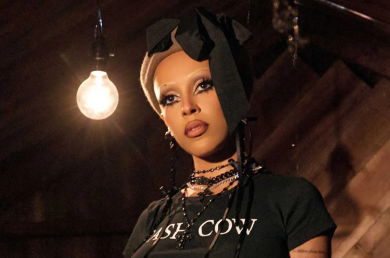By Dylan Stovall, Staff Writer
On Sept. 22, Doja Cat (Amala Ratna Zandile Dlamini) dropped her highly anticipated fourth studio album “Scarlet.” Through the 17 different tracks and a variety of beats, Doja re-examines her relationship to fame and what she owes the public. Rumors regarding the singer/rapper and the current state of social media have driven up Doja’s antics as she seizes her audience and takes them through what some may describe as an evocation.
In an interview with “V Magazine,” Doja Cat shed light on her plans for the rest of her career.
“I have been making music that is palatable, marketable, sellable and that has allowed me to be where I am now. These upcoming projects are going to be very different compared to everything I have done and I am excited about that. I do not care if people are not,” she shared.
After the blockbuster success of her last project, “Planet Her,” Doja was projected onto the world stage and with that came a lot of scrutiny. Fans of her music began critiquing her for who she was associating herself with and how she conducted her behavior online. However, Doja found a way to come back to the spotlight each time using the internet in calculated ways to drive up her status and create the atmosphere she wanted surrounding this album.
Fans of Doja are divided over this new persona and the content of the lyrics.
Senior musical theatre major Sara Miyamoto appreciates the album and the expansion of Doja’s infectious confidence.
“I lived for her being like actually I hate all of you. That was juicy. I think it really set the tone for what to expect for the album and I am living for the new looks. It is really different than what she used to do but I honestly really love it,” Miyamoto shared.

“Scarlet” and the blood stained persona Doja has tied to this album is a reference to Nathaniel Hawthorne’s novel, “The Scarlet Letter.” Cancel culture and rumors of her selling her soul to the devil for fame is what leads to the aggressive charge behind some of her lyrics, aimed specifically at her fans.
Miyamoto shared their thoughts on Doja Cat’s online antics prior to the release of the album.
“Her being like I don’t know you. That’s real. The people who got mad about that I was like: you don’t know her and she doesn’t know you. She was a dancer before her whole music career. She has a grammy,” Miyamoto expressed.
One song in particular, “F**k The Girls (FTG),” Doja criticizes her audience for constantly switching up on how they feel about her. She elaborates that she only needs the support she can get from herself. The subtext of this song deals with misogyny and its toll on the industry, where female celebrities are often pitted against one another.
For sophomore musical theatre major Jacob Schmitt, this was his introduction to Doja.
“I just didn’t really know much. I didn’t really care much about Doja Cat before this album came out. I thought she was kinda crazy. I have seen some of the crazy outfits she wears. But other than that I wasn’t a huge fan,” shared Schmitt.
He shared his thoughts on the album’s lyricism and production.
“I think the beat goes crazy. She is dropping bars. I can’t believe she is rapping these
words over and over again. It’s so vulgar but men rap about this stuff all the time and people are indifferent to it. Go her,” Schmitt expressed.
Schmitt also viewed the horror-themed music videos released for the album.
“The ‘Demons’ video is scary. Let me tell you about it. It’s Doja Cat in her most demonic-self haunting a house and a woman specifically. She’s terrorizing the viewer. She’s pitched black. She has big horns, red eyes and a pointy fork tongue. She walks up the wall, she does acrobatics, she hides in the showers and has big sharp teeth,” Schmitt explained.
Both Schmitt and Miyamoto embrace the darker side of Doja and acknowledge the freedom she has found in this new “era.”
Doja expressed her feelings on losing fans during this new era of her career in an interview with “Teen Vogue.”
“Seeing all these people unfollow me makes me feel like I’ve defeated a large beast that’s been holding me down for so long and it feels like I can reconnect with the people who really matter and love me for who I am and not for who I was,” Doja confided. “I’m not real to them. So when people become engaged with someone they don’t even know on the internet, they kind of take ownership over that person.”
Although the album missed the deadline to be eligible for this year’s Grammys by a week, there is still hope for Doja to score some gold from her single “Paint The Town Red” and the accompanying music video. Currently, “Paint The Town Red” has spent the last four weeks at number one on the Billboard Global 200 and there’s no sign of slowing as the internet continues to debate over the demonic nature of her lyrics and her association with the Illuminati. If fans want to decide for themselves where she stands, they will have to find their answers in “Scarlet’s” 57-minute parley.




Be First to Comment